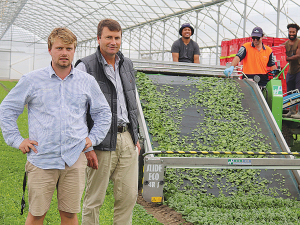Horticulture leader Dr Stuart Davis remembered for lasting legacy
A pillar of New Zealand's horticultural industry, Dr Stuart Davis, was farewelled at a well-attended funeral service in Tuakau, South Auckland, on December 18.
 Leaderbrand manager glasshouse operation, Billy Stackhouse (left) and chief executive Richard Burke with the electric harvester.
Leaderbrand manager glasshouse operation, Billy Stackhouse (left) and chief executive Richard Burke with the electric harvester.
A couple of challenging years has not stopped one of the country’s leading commercial growers from investing in state-ofthe- art technology.
This comes in the form of a new machine to harvest lettuce, spinach and other leafy green crops used to in salads in ready-to-use consumer packs.
The aim of adopting this new technology is to improve their environmental footprint but at the same time, not compromise their goal of being a cost-effective business.
Leaderbrand, which has its main operation in Gisborne plus sites in Pukekohe, Matamata and Canterbury, is trialling the electric harvester in its mega (11ha) greenhouse near Gisborne.
Tairawhiti has experienced some of the heaviest rainfall in its history. Leaderbrand chief executive, Richard Burke, says in the last calendar year they got 2100mm of rain.
It’s not just one year of heavy rain – it’s been multiple years, and this made it difficult to grow crops in the saturated soil and to get them to market with major road closures.
One of the reasons Leaderbrand built its state-of-the-art glasshouse was to allow them to keep up the continuous rotation of crops without being at the mercy of the weather.
They survive as a business, according to Burke, by producing high-quality, fresh and affordable products, and it’s this mantra that drives their business.
“We are trying to get between six and nine rotations a year as opposed to two or three,” he says.
There are many different challenges growing indoors, but Burke says dealing with such things as disease in a glasshouse is easy because you have a lot more control. However, if you get it wrong, it goes wrong across your whole crop.
Burke says, in the glasshouse, instead of spraying the residue of a crop and then ploughing it back into the ground, they burn it off with a special machine which controls the disease problem better than spraying.
Battery-Powered Helping Hand
Leaderbrand had traditionally harvested its leafy green packaged salad crop in a unique way.
They grow them in rows and a machine cuts the leaves and then comes back weeks later and repeats the cut.
But in the glasshouse the company is trialling a new battery-powered harvesting machine. Richard Burke says they started looking at electric vehicles some years ago and decided to trial such a machine under glass where the environment is dust, rain and mud free.
“For us it was a bit of sneak peek into the future to see how they worked and get used to working them, because you need to operate them to work out how to get the best out of them. Essentially, we have replaced diesel with electric and if you asked us now if it was a good or bad idea, the jury is still out,” he says.
However, Burke says the more time they spend with them, the more comfortable they feel with them, and they certainly provide a nice, quiet working environment. He says there are also some advantages with the chase trailers that take the cut lettuce of spinach and stack it.
He says technology is important, but adds that it must be cost effective and fit with the Leaderbrand ethos which is to provide cost-effective food for Kiwis.
He says one cannot ignore the benefits of electricity in terms of what it means to the environment and chasing that ideal is good, as long the benefits stack up. Burke says consumers who pick up a bag of salad in the supermarket aren’t thinking about whether the producer has electric tractors or not.
New Zealand's new Special Agricultural Trade Envoy, Horowhenua dairy farmer, company director and former Minister of Agriculture, Nathan Guy says the Free Trade Agreement (FTA) with India is a good deal for the country.
New figures show dairy farmers are not only holding on to their international workforce, but are also supporting those staff to step into higher-skilled roles on farm.
New tractor deliveries for 2025 jumped 10% compared to the previous year, a reflection of the positive primary sector outlook, according to the Tractor and Machinery Association (TAMA).
Entries have opened for two awards in the New Zealand Dairy Industry Awards (NZDIA) programme, aimed at helping young farmers progress to farm ownership.
Federated Farmers has confirmed interim chief executive Mike Siermans to the role.
Registrations are now open for the 2026 Ruralco Golf Classic, with all proceeds from the event set to support the Mid Canterbury Rural Support Trust.